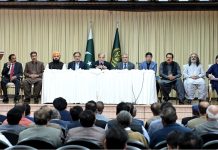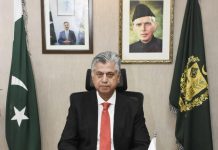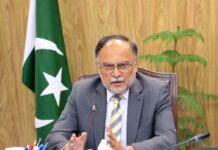ISLAMABAD/KARACHI: The first phase of head-count began in 63 districts under the sixth population census on Saturday.
The districts include 16 in Punjab, eight in Sindh, 14 in Khyber Pakhtunkhwa, 15 in Balochistan and five each in Azad Jammu Kashmir and Gilgit Baltistan. The exercise will continue for 10 days.
For the first time, transsexual people will be counted separately. The forms had been printed in advance of court decisions to include them in the count. Now enumerators have been informed that those surveyed will have three numeric choices for their gender: men, women and transsexuals. According to Chief Census Commissioner Asif Bajwa, it was the ultimate goal of the PBS to make the process transparent and internationally acceptable and credible, so mechanism has been devised in a way to ensure its validity and credibility. He informed the media people that only ball point would be used for filling the forms. To a question, he said that if any house was missing in the house-listing operation they could access PBS through helpline for the inclusion of that house in the process. The services of 84,000 enumerators are being utilised in collecting the data from about 168,120 census blocks across the country. The PBS has reserved about 10 percent staff and supervisors, hence bringing the total staff for census to over 118,000 persons, the largest ever.
In addition to enumerators, 200,000 army officials have been engaged for the exercise, they said, adding that one army soldier would be attached with one enumerator throughout the exercise and they would be provided proper security cover-up by the army.
The census is being conducted after a gap of 19 years. The last census was done back in 1998 during Nawaz Sharif’s second stint.
A representative of the Bureau of Statistics told a private TV channel that the house count exercise will be completed along with the headcount data collection in different areas of Karachi.
A central control room to monitor the data collection exercise was formed in the office of SP Gulberg, Central District. “The appointed officers are already in the field. Data for specially-abled and transgender persons will be manually recorded through new codes,” said Bajwa. “Even the Supreme Court has accepted that it is impossible to change the forms at this stage.” The chief census commissioner added that due to the availability of armed forces for a lesser period of time, some important services were postponed. “The forces were made available for 10 days this time; last time we had their services available for 15 days,” Bajwa said.
Separately, census activities were postponed until July in 25 villages in Gultari Valley due to a heavy snowstorm and blocked roads.
According to a local news channel, sources informed that more than half of Gilgit Baltistan’s population lives in the tallest snow-ridden mountains. Census officials have to wait until the snow melts down toward the end of April and beginning of May, in order to reach these areas.
The sixth population census data collection activities were carried out atop the tallest mountains in Pakistan Thursday.
Field staff traversed through the snow-ridden paths for hours to reach far-flung villages, to complete the house and headcount data collection that began in March.
Five districts of GB are part of the first phase of the census, which includes the collection of house count statistics that include offices, hotels and hostels, factories, schools, colleges, houses, and worship places.














